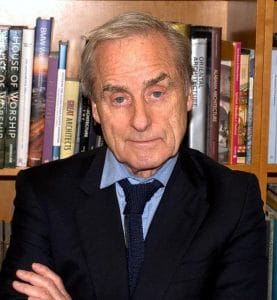Born in Manchester, England, Evans found his profession at age 16: he became a newspaper reporter for a weekly in Ashton-under-Lyne, Lancashire. His career was sidelined by a three-year stint in the Royal Air Force; upon his return he studied economics and politics, and upon graduation in 1952 he was hired as an editor of the Manchester Evening News. In 1966 he moved to London to accept an editorship at The Sunday Times.

Evans was particularly incensed that women and children harmed by the thalidomide scandal — a prescription drug that caused terrible birth defects when taken by pregnant women — particularly that the drug’s victims had never received compensation. As the newspaper’s top editor, he directed coverage campaigning for compensation — at great professional risk: At the time in the U.K. it was legal to editorialize on civil lawsuits, but it was actually illegal to report the facts of the cases! The newspaper, through Evans, supported lawsuits against the Distillers Company, which marketed the drug in the U.K. — and was the newspaper’s biggest advertiser. With the Times’ support, the plaintiffs won in the European Court of Human Rights in 1979. So-called “thalidomide babies” were eventually paid 32.5 million pounds (about US$70 million) in compensation. The government, meanwhile, changed its laws to give newspapers the right to report on such cases.
Evans was still at the Times when Rupert Murdoch bought it out in 1981, but by early 1982 Evans resigned, citing policy differences with Murdoch over editorial independence. He moved to the United States to teach at Duke and Yale Universities, serve as the editorial director of U.S. News & World Report, serve as president and publisher of Random House, as well as editor at large at the Reuters wire service. He also lost his anger at Rupert Murdoch. “I have to remind myself,” Evans wrote about Murdoch in his memoir Good Times, Bad Times, “that Lucifer is the most arresting character in Milton’s Paradise Lost.” A 2002 poll in Britain named Evans the greatest newspaper editor of all time, and he was knighted by the queen in 2004 for his service to journalism. Sir Harold Evans died September 23, from congestive heart failure. He was 92.
Related: My article that’s an expansion of a 2015 Honorary Unsubscribe: The Woman Who Saved America from a Drug Disaster.
